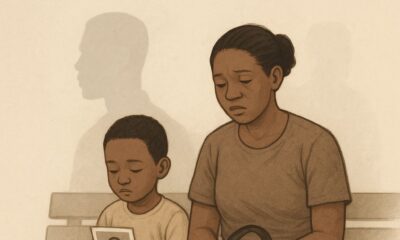Features
Temi Olajide: Protect Your Kids From Bullying
It’s not only you who needs to know about bullying. This is something you want your child to know about before they ever have to confront it. You prepare your child on how to handle the situation when someone is trying to bully them.
 Bullying among kids is very common, but it doesn’t have to adversely impact your child for a lifetime. Understanding what bullying is will help parents protect their child(ren) from or teach them how to handle bullies.
Bullying among kids is very common, but it doesn’t have to adversely impact your child for a lifetime. Understanding what bullying is will help parents protect their child(ren) from or teach them how to handle bullies.
Bullying is a type of emotional or physical abuse that has three defining characteristics:
Deliberate – the bully’s intention is to deliberately hurt someone.
Repeated – the bully’s behaviour is repeated or has the potential to be repetitive.
Power Imbalanced – the bully chooses victims they perceive to be vulnerable.
These three aspects must be included for a behaviour to be labelled as ‘bullying’.
There are many actions that look like bullying but may not necessarily be so. It is, thus, important to ascertain whether the situation is bullying or something else. It is also imperative to understand the different forms bullying can take and their varying range of severity.
Bullying may be:
Physical – poking, pushing, hitting, kicking, beating up.
Verbal – yelling, taunting, name-calling, insulting, threatening to harm.
Relational – segregation, spreading rumours, getting others to hurt someone.
Cyberbullying – sending hurtful messages or images via the internet or cell phone.
Bullying can also be any combination of these.
What can parents do to protect their kids from bullying?
Recognize Signs of Bullying
These signs can be subtle or glaring for anyone to see. Your child can be a victim of bullying if you notice any of these signs from him or her:
- If they become reluctant or refuse to go to school. Or generally clam up when you try to discuss school.
- If they are hungrier than usual after school, it might be a sign that someone is stealing their lunch money or that he is unwilling to brave the cafeteria at lunchtime.
- If their performance in school (grades, homework, attendance) suddenly declines.
- If they are always sullen, angry, and frequently want to be left alone.
- If there are obvious behaviour changes after computer time or a phone call.
- If they start asking for more lunch or transportation money without a clear explanation of why it is needed.
- If they have unexplained bruises or injuries.
Though kids may have many reasons for not telling adults when they are being bullied, you can spot any of the above signs and proceed to the next step.
Talk About Bullying
It’s not only you who needs to know about bullying. This is something you want your child to know about before they ever have to confront it. You prepare your child on how to handle the situation when someone is trying to bully them.
In addition, educate your children about how bullying is different from mere typical conflict with a peer.
When you help your kid(s) distinguish if a certain behaviour is actually bullying, you will help them to identify when they are experiencing something else – such as conflict with a friend – that is absolutely normal. It will also teach them how to get along with others.
Teach Them to Exercise Self-control
The normal thing to do when provoked is to react, and bullies derive enjoyment from watching victims react. However, the bully may lose interest if the victim chooses not to react, respond to taunts or the invitation to fight.
Most times, children are targets when the bully perceives that they are afraid and have low self-esteem. On the other hand, confident children exhibit strength and stability – bullies usually do not prey on such children. Find ways to help your children develop a healthy self-image through sports, music or other areas they may be interested in.
Help them acquire interpersonal skills
Bullying can be non-verbal and the victim is often ostracised by others. That’s why many victims of bullying usually lack the interpersonal skills to make lasting friendships.
Teach your children to relate well with others
You can encourage your children to initiate conversations. Your children will also learn when you lead by example by relating well with others in the society.
As parents, build relationships with your kids through conversations, going on picnics together, going to see movies together or even by eating together. It’s a great way to bond with your kids. Don’t underestimate these simple activities you do with them — they teach your children basic social skills. Furthermore, when your bond with your kids is strong, it will be easier to talk to you about whatever it is they’re experiencing.
While it is great to let your kids know you will always be there for them, it is also important to teach them how to stand for themselves.
Have any tips for dealing with bullies? Feel free to share them with me.



















